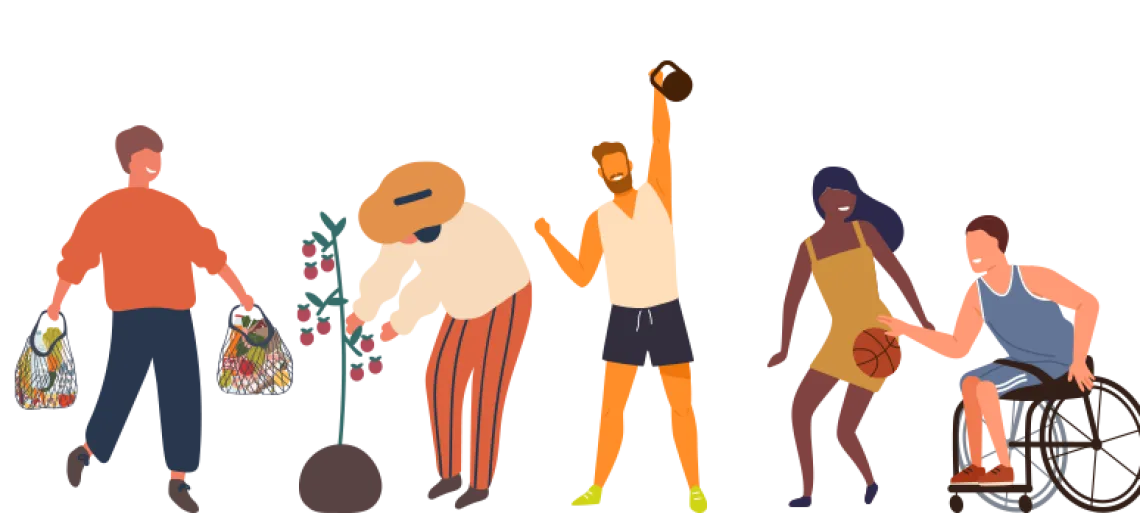Make Time for Movement

Good nutrition and physical activity are linked to better health outcomes for everyone of all ages, sexes and abilities, which includes pregnant people. Those who regularly participate in physical activity benefit from a reduced risk of chronic disease, reduced risk of certain cancers, improved feelings of overall well-being, better sleep, improved brain health and a maintained healthy weight. These are just a few positive benefits that anyone can gain from regular physical activity.
If you're looking for ways to get in some moderate physical activity, alone or with friends, here are three ideas.
- Have a dance party after dinner. Throw on some of your favorite tunes and dance around while you are cleaning up.
- Give the Bring Sally Up Squat Challenge a try. The song featured in the video, "Flower" by Moby, is perfect for bodyweight exercises. Using the lyrics as a cue, viewers squat and stand repeatedly. It's fun but much harder than it sounds.
- Work out that brain while you work out the rest of your body. Head outside and move around while playing the alphabet game. As you walk, look for a word that starts with the letter A. Then find words that start with the letter B, then C, and so on all the way until Z, when the game ends. This works whether you're alone or with friends!
Double your benefits
Solo exercise is great but exercising with a friend or group can be more beneficial than you think. Along with the great physical benefits, you also nurture your social health by forging new or deeper connections with friends, neighbors and colleagues.
Ready to try it? You have an opportunity to focus on your physical and social health this spring by joining a Move Arizona team. Move Arizona is an eight-week physical activity program designed to improve health through creating or reinforcing a physical activity habit.
Two University employees had those benefits in mind when they signed up to be team captains.
"I looked at Move Arizona as an opportunity to help motivate me to be more active since I sit in front of a computer all day," said Wendy Epley, principal analyst in the Information Security Office. "It also provides me with a means to engage more with my colleagues."
Tina Douglas, senior coordinator of graduate student programs in the College of Engineering, sees the same advantages. "It's an opportunity to spend time and have conversations with colleagues outside of Zoom meetings and emails."
For most, getting enough daily physical activity can be a challenge. Move Arizona encourages a goal of 150-300 minutes of moderate physical activity per week, broken into chunks of 30 to 60 minutes or smaller periods of 10 to 15 minutes per day.
Meeting those goals is easier when there's a team behind you.
"I like the idea of a friendly competition between teammates and the other teams, to get people motivated and moving," said Cindy Kontowicz, an associate accountant for the Large Binocular Telescope Observatory, another team captain. "I also believe it helps productivity to get away from the desk and move."
Captains are already thinking about how they'll engage their teams, from virtual yoga and gym meetups to lunchtime walks and dance parties.
"I am hoping that my team will be able to meet in person at Christina-Taylor Greene Memorial River Park and walk The Loop while the morning temperatures are still enjoyable," Epley said.
No matter how – or where – you choose to move, or how many minutes you track, getting exercise and nurturing your relationships at home and at work all do the body, and the heart, good.
"I hope that others feel better about themselves and that they are able to improve or continue to improve their health to live long healthy lives," said Jenny Rea, assistant professor of practice in the College of Applied Science and Technology.
Move Arizona starts Feb. 23 and runs through April 19. Those interested in leading a team should register on or before Feb. 2. An orientation for captains will be held at noon on Feb. 2.
For science-based guidance about how people ages 3 and older can improve their health through participation in regular physical activity, visit the Physical Activity Guidelines for Americans, which is published by the U.S. Department of Health and Human Services.

